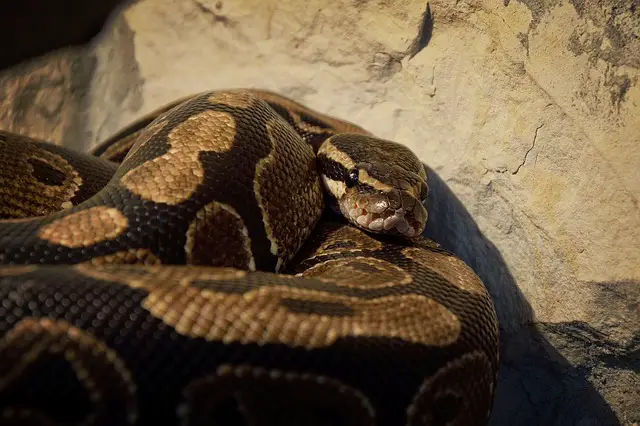Do you have a royal python as a pet? If so, you may be wondering how often he or she goes to the bathroom. Royal pythons are known for being one of the cleanest snakes in the world – they typically only poop once a week! In this blog post, we will discuss the amazing digestive system of royal pythons and why they are able to go so long without pooping. We will also dispel some common myths about royal python poop!
One reason that royal pythons are able to go such a long time without pooping is that they have an extremely efficient digestive system. Their bodies are designed in such a way that they can extract all of the nutrients and moisture from their food before eliminating it. This is different from other snakes, who typically excrete a lot of undigested food in their poop.
Another reason that royal pythons don’t have to poop as often as other snakes are that they eat relatively small meals. They will usually only eat once or twice a week, and their meals are not very large. This means that there isn’t a lot of food sitting in their digestive system waiting to be eliminated.
There are some common myths about royal python poop that we want to dispel! One myth is that royal pythons consume so little food that they don’t produce much waste. This is simply not true – while royal pythons may defecate less often than other snakes, they actually produce a fairly large amount of waste when they do go. Another myth is that royal python poop doesn’t smell. Again, this is not true – while royal python poop may not smell as bad as other snake species, it still has a distinct odor.
Where in the tank will they poop?
Now that we’ve answered the question of how often royal pythons poop, you may be wondering where they will do their business in your tank. The good news is that royal pythons are very clean snakes and will usually only defecate in one specific area of their enclosure. This area is typically a hide box or some other type of shelter that they feel safe in. Royal pythons will also sometimes travel to the same spot to urinate, so you may see a small pool of urine in their enclosure as well.
If you find that your royal python is pooping outside of his or her designated area, there are a few possible reasons why this may be happening. One possibility is that the snake is not feeling well and is trying to find a more comfortable spot to relieve himself. Another possibility is that the enclosure is not big enough for the snake and he or she does not have a designated area to poop in. If this is the case, you will need to get a larger enclosure for your royal python.
How often should the poop be removed and how to clean the tank?
Now that you know where your royal python will be doing his or her business, you may be wondering how often you should be cleaning the tank. The good news is that royal python poop is not very smelly and does not need to be removed every day. In fact, it is typically only necessary to remove royal python poop once a week or so. However, if you find that the poop is starting to smell bad or attract flies, then you will need to remove it more frequently.
When removing royal python poop from the tank, it is important to use gloves and disinfectant. Royal pythons can carry bacteria on their skin that can make humans sick, so it is important to avoid contact with their waste products. Once you have removed the poop, you will need to disinfect the area where it was found. This can be done by spraying the area with a diluted bleach solution or using a commercial reptile disinfectant.
Conclusion
We hope that this blog post has helped you understand more about the digestive system of royal pythons and where they like to do their business! Remember, if you have any questions about your snake’s health or behavior, it’s always best to consult with a qualified reptile veterinarian. They will be able to help you figure out what is going on and get your royal python back on track!
FAQ’s
Q: How often should I be cleaning my royal python’s tank?
A: It is typically only necessary to remove royal python poop once a week or so. However, if you find that the poop is starting to smell bad or attract flies, then you will need to remove it more frequently.
Q: My royal python is pooping outside of his designated area. What does this mean?
A: One possibility is that the snake is not feeling well and is trying to find a more comfortable spot to relieve himself. Another possibility is that the enclosure is not big enough for the snake and he or she does not have a designated area to poop in. If this is the case, you will need to get a larger enclosure for your royal python.
Q: Do I need to use gloves when removing royal python poop from the tank?
A: Yes, you should always use gloves when handling royal python waste products. Royal pythons can carry bacteria on their skin that can make humans sick, so it is important to avoid contact with their waste products. Once you have removed the poop, you will need to disinfect the area where it was found. This can be done by spraying the area with a diluted bleach solution or using a commercial reptile disinfectant.




